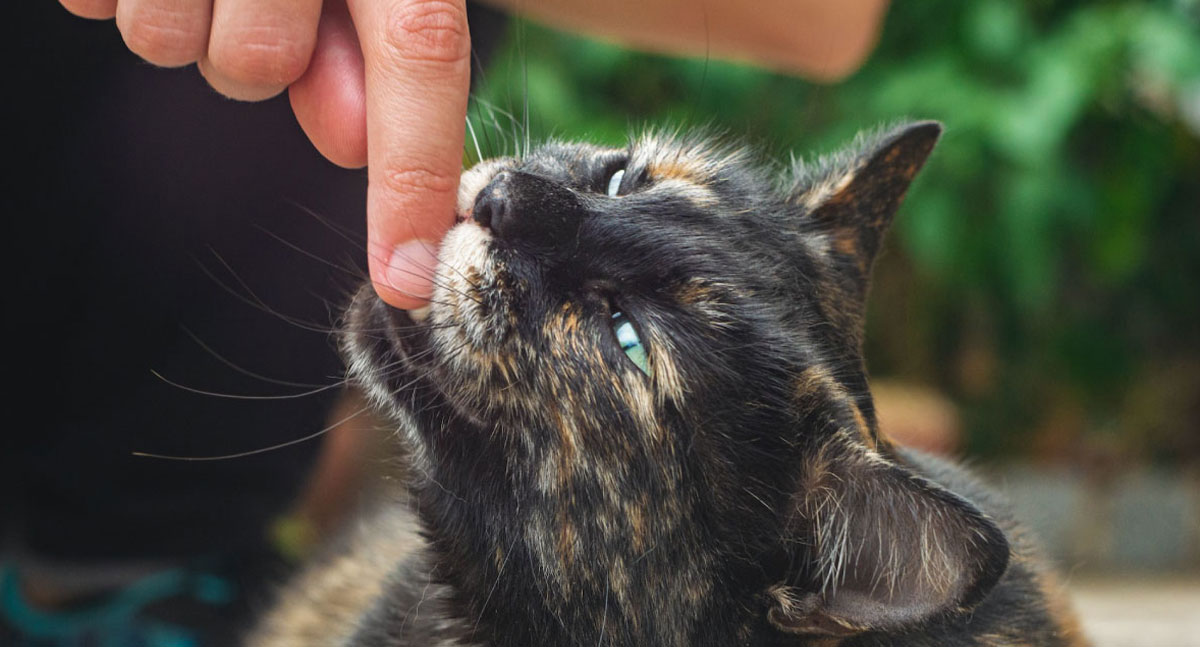Why Does My Cat Bite Me?

With 11.1 million cats kept as pets in the UK, there is no denying we are a nation of feline fanatics. Even with 1 in 3 homes owning a cat, their behaviour can still feel mysterious and in some cases difficult to deal with.
Feeling under attack in your own home from your much-loved moggy? Aggression can be a common behaviour but is a complicated one to unpack. Understanding why your cat is biting you, comes down to identifying what type of aggression they are exhibiting.
Redirected Aggression
Often described as ‘unprovoked’ or ‘out of the blue’. Those who say they aren’t fans of cats typically cite this as the reason why. This behaviour is caused by cats being aggressively agitated by something they cannot get to. For example: a bird outside or a neighbourhood cat.
This leads to a build-up of tension and the cat lashes out on another person in the household. This behaviour can be difficult to determine as the attack often doesn’t happen straight away. In some cases, half an hour to a couple of hours after they have spotted the trigger of their agitation.
Play Aggression
This is aggressive predator behaviour directed towards owners during play. Cats can stalk, chase, pounce, kick, scratch and bite their owners.
Petting Induced Aggression
Sometimes perhaps wrongly referred to as ‘love biting’. The repeated motion of stroking over and over can start to feel unpleasant to some cats and cause them to strike out.
According to studies many cat owners may actually be stroking their cats the wrong way…
Aggression in Kittens
Kittens are stimulated by EVERYTHING, and your hands/legs/arms are no exception. Most cats will grow out of attacking their humans, but it is important to establish the rules when they are young.
Do not use your hands during play or encourage your kitty to attack wiggling fingers. This is only setting yourself up for more painful adult bites.
How to Stop Cat Aggression
There are a few things you can do to reduce your cat biting:
• Keep them Happy! Cats that are stressed are more likely to lash out at their owners. Read our 5 Tips for Happy Cats blog for advice.
• Know the warning signs! Pay close attention to body language, especially when stroking your cat. A flicking tail, flattening ears and dilated pupils are signs your cat is irritated.
• Redirect their Attention! If your cat often attacks you during play, use toys to direct their predator instinct. Playing with cats can seem difficult, so if you need help getting your kitty excited then read our Guide to Playing with Cats.
• Don’t Respond to the Attack! If your cat likes to strike out during playtime, try not responding to the unprovoked attack. Raising your voice and suddenly moving away can sometimes stimulate your cat’s predator instincts further. Instead keep still, play dead and perhaps throw a toy to divert their attention.
• Use a Supportive Product! An extra level of calm in the household can help reduce cats’ aggressive feelings and make them feel more settled. Try using more calming products in the household.
• Look for Patterns! In the case of Redirected Aggression, it is an outside influence causing your kitty to lash out. Keep an eye on what’s happening outside/around your cat and take appropriate steps to distract from that influence.
Ultimately cat aggression can be a very complicated behaviour and will sometimes need the help of a professional.
However, by understanding cats better and keeping them happy and healthy, you will have a stronger bond with your feline friend.


